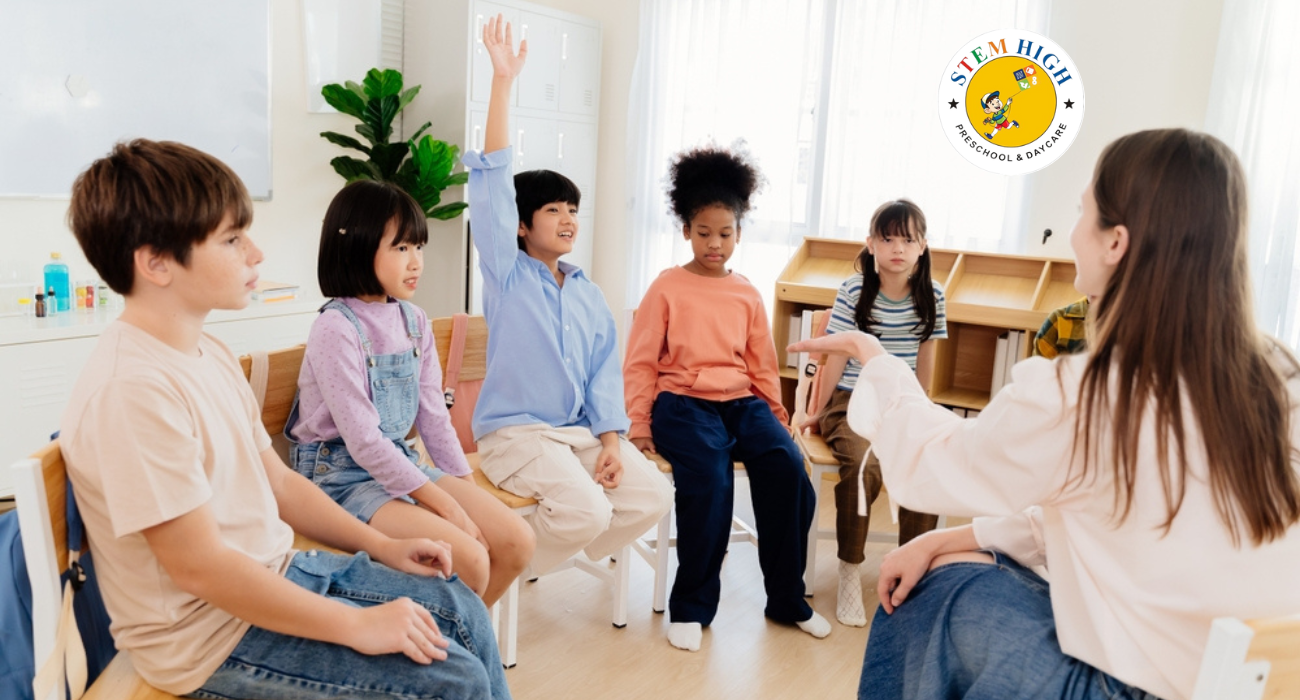STEM HIGH PreSchool
Get In Touch
Monday to Friday: 09:00am – 07:00pm
Sunday: Close
Email:stemhighpreschool@gmail.com
Phone:+91 8050125666
Monday to Friday: 09:00am – 07:00pm
Sunday: Close
Email:stemhighpreschool@gmail.com
Phone:+91 8050125666

Teamwork is an essential life skill that transcends professional and personal boundaries. Whether it’s collaborating in the workplace, functioning effectively in a community, or building strong family relationships, the ability to work well with others is fundamental to success. Group activities offer an excellent way to foster teamwork skills, enabling individuals to learn, grow, and thrive in collaborative settings. This blog explores how group activities encourage teamwork, the benefits they provide, and examples of activities that promote cooperation.
Teamwork is more than just working together to achieve a common goal. It involves effective communication, active listening, empathy, mutual respect, and adaptability. Here’s why it matters:
Group activities are structured tasks or exercises designed to bring people together and encourage them to collaborate. These activities serve as practical platforms for developing teamwork skills. Here are some key ways they contribute:
Group activities have numerous benefits, including:
Participating in group activities helps individuals learn how to interact positively with others. Skills such as negotiation, compromise, and conflict resolution are developed naturally.
Accomplishing tasks as a team provides a sense of achievement and boosts morale. Celebrating success together strengthens bonds and reinforces teamwork.
Group activities are often engaging and enjoyable, making participants more invested in the process. This fosters enthusiasm and a proactive mindset.
Through hands-on experience, participants learn teamwork skills that are difficult to teach in a theoretical setting.
Collaborative tasks help build rapport among participants, leading to deeper connections and better relationships.
Activities like escape rooms or solving puzzles in teams require participants to think critically and work together to achieve a goal.
2. Outdoor Adventure Activities
Team sports, hiking, or obstacle courses are excellent ways to promote teamwork. These activities encourage participants to rely on each other and build trust.
Group art projects, theater productions, or brainstorming sessions for innovative ideas encourage collaboration and creativity.
Participating in community service projects as a group fosters a sense of shared purpose and collective achievement.
Simulated scenarios or role-playing games encourage participants to step into different roles and work together to address challenges.
For group activities to be effective in promoting teamwork, consider the following:
While teamwork has numerous benefits, it can also present challenges such as:
Encouraging teamwork goes beyond group activities. Here are some strategies to foster a collaborative mindset:
Teamwork is a cornerstone of success in virtually every aspect of life. Group activities provide an engaging and effective way to cultivate this essential skill, helping individuals develop trust, communication, problem-solving abilities, and leadership qualities. By implementing well-designed group activities and fostering a teamwork-oriented culture, organizations, schools, and communities can empower individuals to work together harmoniously and achieve extraordinary results.
Encouraging teamwork through group activities is not just about accomplishing tasks—it’s about building connections, learning from one another, and growing together. The benefits extend far beyond the activity itself, influencing personal and professional growth, relationships, and overall well-being. So, embrace the power of teamwork and watch how it transforms lives and communities.
Comments are closed